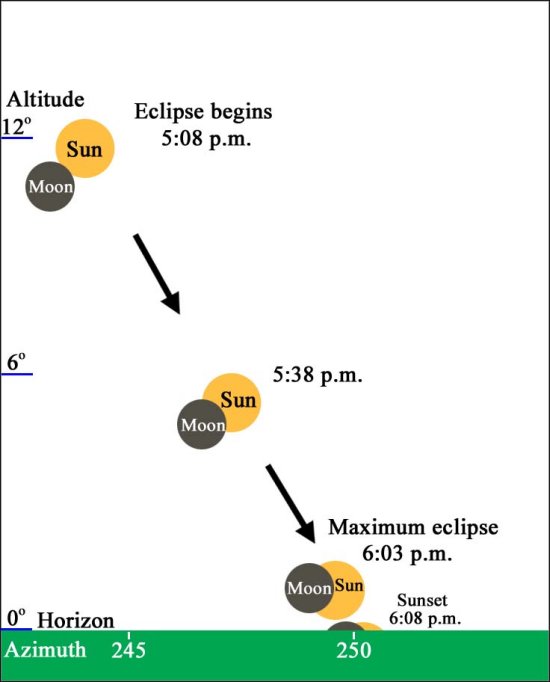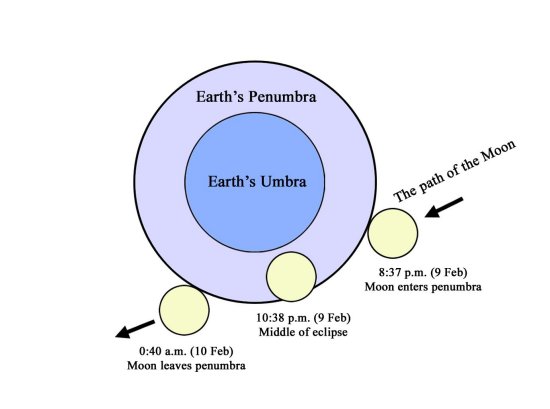Solar and lunar eclipses in first month on Chinese calendar
Solar and lunar eclipses in first month on Chinese calendar
(19 January 2009)
A partial solar eclipse and a penumbral lunar eclipse will be visible in Hong Kong in the coming first month on the Chinese calendar, if weather permits. The solar eclipse will occur on January 26 (Monday), the first day of the Lunar New Year. The lunar eclipse will be on February 9 (Monday), which is the 15th day of the first month on the Chinese calendar. In the past 200 years, there have been only three times - 1850, 1962 and 1980 - that a solar eclipse and a lunar eclipse have been visible in Hong Kong in the first month on the Chinese calendar. The next occurrence will be in 2074.
The solar eclipse on January 26 is an annular eclipse but only visible in Hong Kong as a partial eclipse. It will begin at dusk, about 5.08pm, and end around 6.08pm when the sun and the moon descend below the horizon together. The maximum eclipse will be at 6.03pm. This partial eclipse has a magnitude of 0.381, meaning that 38.1% of the sun's diameter will be obscured by the moon at maximum eclipse. Please refer to the attached diagram I for the path of the sun and the moon during this partial eclipse. (The attached diagram is only for illustrative purpose. Sizes of the sun and the moon are drawn not to the scale of the background.)
Details of the partial eclipse are as follows:
|
Hong Kong Time |
Azimuth Direction |
Elevation | |
|---|---|---|---|
| Eclipse begins |
5.08 p.m. |
West-southwest |
12 degrees |
| Maximum eclipse |
6.03 p.m. |
West-southwest |
0 degrees |
| Sunset |
6.08 p.m. |
West-southwest |
-1 degrees |
At the beginning of the eclipse, the sun will be in the direction of west-southwest with an elevation of 12 degrees. The best places to observe this eclipse will be those with an unobstructed view to the west-southwest above the horizon, such as Tai O, Lamma Island and the top of Tai Mo Shan.
Although this solar eclipse will occur near sunset, sunlight could still be rather strong. People must not look directly at the sun with the naked eye or through a telescope. A safer method is to project the sun's image through a pinhole or a telescope onto a piece of white paper or cardboard and view the projection. An illustration is given on the Observatory's website: http://www.weather.gov.hk/gts/event/event-solar-eclps16e.htm .
The next solar eclipse observable in Hong Kong will be on July 22, 2009. It will be a total eclipse but visible only as a partial eclipse in Hong Kong.
Please refer to the Observatory's website for a detailed explanation of the technical terms used for different stages of the eclipse: http://www.weather.gov.hk/en/gts/astron2009/solar_eclipse.htm .
The lunar eclipse on February 9 is a penumbral eclipse of the moon, which is when the moon passes only through the penumbra (partial shadow) of the earth's shadow without entering the umbra (total shadow). During the event, the moon will become only slightly dimmer.
The penumbral eclipse will occur between 8.37pm on February 9 and 12.40am on February 10 and last for about four hours and three minutes. Please refer to the attached diagram II for the path of the moon during the eclipse.
Details of the eclipse are as follows:
|
Hong Kong Time |
Azimuth Direction |
Elevation | |
|---|---|---|---|
| Moonrise |
6.02 p.m. (February 9) |
East-northeast |
-1 degrees |
| Moon enters penumbra |
8.37 p.m. (February 9) |
East |
33 degrees |
| Middle of eclipse |
10.38 p.m.(February 9) |
East-southeast |
60 degrees |
| Moon leaves penumbra |
12.40 a.m. (February 10) |
South |
81 degrees |
| Moonset |
7.12 a.m.(February 10) |
West-northwest |
-1 degrees |
As the elevation of the moon is rather high during the eclipse, most places with an unobstructed view to the east and east-southeast are suitable for viewing the event.
The next lunar eclipse observable in Hong Kong will be on January 1, 2010. It will be a partial eclipse.
Please refer to the Observatory's website for a detailed explanation of the technical terms used for different stages of the eclipse including the meaning of penumbral lunar eclipse:
http://www.weather.gov.hk/en/gts/astron2009/lunar_eclipse.htm

Diagram I:Partial eclipse of the sun on January 26

Diagram II:Penumbral eclipse of the moon on February 9